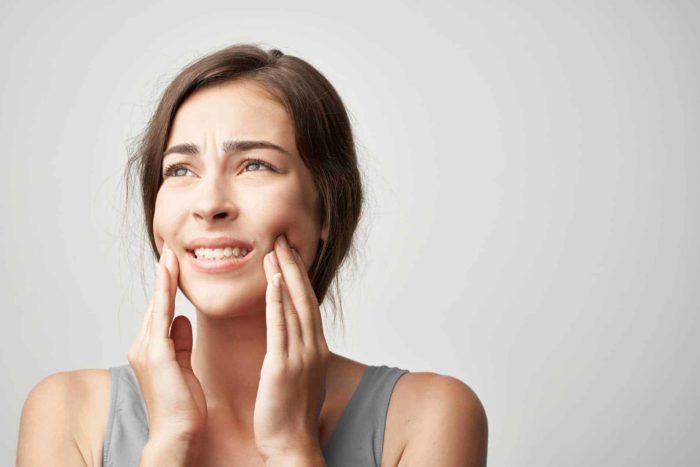Toothache: At home relief to stop toothaches. These things will help, so you can sleep and carry-on with activities.
Throbbing dental pain can completely distract a person from all other concerns such as sleep, child-care, work and play. Nature made tooth pain severe to serve as a personal warning. Therefore, have the tooth looked after by a dentist as soon as possible. As evidence of the seriousness of dental pain: Dental visits account for 2.5% of emergency department visits and represented the second-most-common discharge diagnosis in adults aged 20 to 39 years.
Toothaches, have the potential to spread throughout the head and neck. These infections can include the sinuses, eyes, and brain. Speaking plainly, dental infections are not to be played with.
Excluding trauma, dental pain is most often caused by three different conditions. Those painful dental conditions in order of severity are:
- Tooth decay (cavities)
- Tooth clenching (bruxing)
- Gum infection (periodontal disease)
Toothaches caused by cavities
Things that provide pain relief:
-
Pain Medication
The most effective over the counter dental pain medications are the (NSAIDs) anti-inflammatories. The names of these drugs are: Ibuprofen, naproxen and ketoprofen. Aspirin and acetaminophen are also effective. All of these medicines are available at grocery and drug stores.
Tooth pain is usually caused by swollen tissue contained in the hollow portion at the center of a tooth. Because ibuprofen can reduce swelling, it’s a great medicine to relieve toothaches. Acetaminophen (Tylenol) on the other hand, has no effect on swelling. Because Tylenol does not reduce swelling, it is therefore less effective in helping to resolve toothaches. Always follow the drugs labeled instructions.
-
Anesthetic creams, ointments and gels
These creams, usually containing the topical anesthetic named benzocaine. Anesthetic ointment can be dabbed or applied directly on swollen gum tissue or within the hole of decayed teeth. Usually benzocaine will provide mild pain relief for a short period of time. Follow the label instructions, particularly when using benzocaine to treat children’s dental pain.
-
Cold compress
A bag of ice chips applied to the cheek on the affected side of the mouth can be helpful by reducing swelling and discomfort. Using the ice intermittently every 15 – 20 minutes will provide the benefits from the cold while preventing frostbite and cold induced discomfort.
-
Clove Oil (eugenol)
Eugenol is an oil and maybe purchased in pharmacies. A few drops placed within a broken tooth can provide significant pain relief. Alternatively, a few cloves can be moistened, ground up and placed within the tooth hole or simply placed between the cheek and tooth, left to slowly soak into the tooth.
-
Peppermint tea
Peppermint is an antibacterial herb. Placing a moist peppermint tea bag on top of a badly decayed tooth and keeping it in place for an extended period of time can be comforting and cause mild numbing from the menthol, an ingredient of peppermint. Do not substitute a peppermint candy for a tea bag as the sugar containing candy may supercharge the discomfort.
-
Alcohol (liquor)
Drinking alcohol such as Vodka or Whiskey can be held in the mouth, allowed to soak into a severely decayed tooth. The alcohol like peppermint can provide both an antibacterial and anesthetic temporary benefit. Depending on age and personal choice the alcohol maybe expectorated or swallowed but done responsibly.
7. Warm water swish
Simply rinsing your mouth vigorously with warm will help. Warm water can sooth and cause less sensitivity than cold water. Additionally, swishing will dislodge food particles and dilute sugars that may be aggravating a tooth.
Toothaches caused by clenching (bruxism)

jaw pain clenching
At home remedies for toothache relief
1. Pain medication
Pain medications especially non-steroidal anti-inflammatory drugs can reduce tissue swelling within the tooth and provide dramatic reduction of dental pain. Oral pain medication can be just as effective in the relief of pain from clenching as in treating pain caused by tooth decay.
2. Nightguards
Plastic appliances from a pharmacy can be placed between the upper and lower teeth. These appliances, worn while sleeping, reduce the pressure placed upon the teeth during night time tooth grinding. Appliances purchased from the pharmacy are meant to be used only temporarily. Long-term daily use of store-bought appliances can cause teeth to shift, negatively affecting the way teeth interdigitate. Visit a dentist to have a custom nightguard made to relieve tooth and jaw pain while also protecting the “bite” reducing thermal sensitivity and tooth wear.
Toothache relief: caused by gum infections (periodontal disease)
Three home remedies that work:
-
Pain medication
Over the counter pain medication, used as labeled by the drug maker is the first choice for pain relief.
-
Flossing & brushing
Using dental floss, a tooth brush or vigorous swishing can dislodge a foreign object such as a popcorn hull out from between the tooth and gum. Elimination of an irritant located between the tooth and gum will resolve pain within 24 hours. If the object has recently become lodged between the teeth, pain relief can be instantaneous.
-
Salt water rinse
To be effective salt water rinses must be used 5 – 7 times during the course of a day. The most efficient way to accomplish the rinsing is to place 1.5 teaspoons of table salt into a 12oz. bottle of water. Then shake the bottle to mix. By pre-mixing a batch of salt water, the bottle can be carried around for convenient and frequent usage. Discard the bottle of salt water, and mix a new batch each day. This will prevent bacterial growth within the bottle. Do not swallow the water because it can cause thirst and hypertension. The bacteria that cause gum disease cannot live in a salty environment. Therefore rinsing with saline can resolve tender, bleeding and painful gum infections.
There are no do-it-yourself treatments or cures for cavities and periodontal disease. However, the suggestions listed above relieve pain, swelling, discomfort and provide a better night’s rest.
See your dentist for professional help.
Dentistry, at its best, is about prevention. The second-best option is early treatment. Therefore it’s best to call a dentist and get professional help as soon as possible. With proper care teeth can last a lifetime. Everyone deserves strong and health teeth. The first step forward toward dental health is to contact a dentist and get regular check-ups, cleanings and other needed care.
If facial swelling with or without fever should develop near the eye, under the tongue, or involve the neck – an immediate visit to the dentist or emergency room is warranted.









